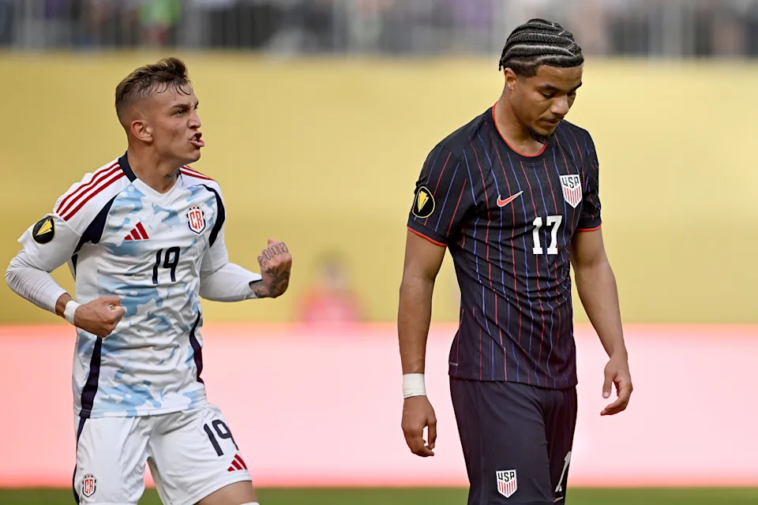ST. LOUIS — Tim Ream has perhaps the coolest head on the U.S. men’s national team, a calmness developed over 15-plus years in professional soccer, impervious to the madness and s***housery that CONCACAF games so often feature.
“Listen,” Ream said here Tuesday, two days after a wild Gold Cup quarterfinal win over Costa Rica. When matches devolve into melees, he explained, “I’m not one to rush in.”
Advertisement
But when he saw Costa Rican players taunting Malik Tillman, gloating in Tillman’s face after the 23-year-old U.S. star missed a penalty Sunday, Ream’s reaction was calculated and instant.
“Nah,” he thought. “You’re not gonna pick on the quietest guy. … This isn’t happening.”
So he rushed in. And one of his favorite parts of the entire night, a night that ended with songs and boisterous celebrations in the U.S. locker room, was that nine other teammates rushed in, too.
Even goalkeeper Matt Freese sprinted toward the fracas. “He ran 100 meters to be in the fight,” head coach Mauricio Pochettino said Tuesday. “Did you see? That was amazing.”
It epitomized what Pochettino has desperately wanted from the USMNT since he took this job back in September. “I’m Argentino,” he said. “We love to fight.”
Advertisement
But his American players, many felt, hadn’t fought in March. Their losses to Panama and Canada set off a firestorm of criticism targeting the team’s mentality. Christian Pulisic’s decision to sit out this summer’s Gold Cup stoked the flames. Pochettino didn’t explicitly call out his players, but with several comments, he implied that he agreed.
So, with his Gold Cup roster, he sent a message. He dropped some semi-established regulars and called in an unproven batch of MLS players. They reported to Chicago on June 1 to learn, yes, but also to bond, and develop the connections that would inspire them all to fight as one.
And on their 29th day together, that’s what they did.
Which is why the fracas that followed Tillman’s penalty was “an enjoyable thing to see,” Ream said. “Because I think it shows that, OK, finally, we’re a group. We’re a group of guys that, we’re gonna push back. You’re not gonna push us around. We’re not gonna take that kinda s***. And we have the personalities in here.”
Advertisement
Pochettino knew he had some personalities. He spoke Tuesday at a press conference next to Tyler Adams. “This guy,” Pochettino said about the scuffle, “obviously is going to be involved, because … he like to fight.” He smiled.
“Now,” Pochettino continued, “what we are seeing is, it’s not only him, it’s the whole group.”
And “that,” he concluded, “means a lot. Because it means that we are connected.”
Costa Rica’s Kenneth Vargas lets Malik Tillman have it after the USMNT midfielder missed a penalty shot. (Photo by Stephen Maturen/Getty Images)
(Stephen Maturen via Getty Images)
When he took the job last fall, he inherited a group that, in some ways, had been connected for years. But they’d also gotten too comfortable. Pochettino, in that sense, had to break some connections, reset the culture, and build anew.
Advertisement
His first few camps, though, weren’t conducive to doing that. Players would gather Monday or Tuesday; train a couple times, play on Thursday, Friday or Saturday, then again a few days later, “then disappear,” as Pochettino said.
The summer, finally, was an opportunity for the reset. It began with a week of training in Chicago, then two friendlies, then the Gold Cup, which will last three-plus weeks. “For a coaching staff, it’s important to have this type of period with them,” Pochettino said. It has allowed him and players to “really create the link, that emotional link that you need.”
That many of his stars are absent, and new personalities are present, affected the process. It was never a certainty that this somewhat random blend of veterans and newbies would jell, nor that they would succeed.
But Sunday felt like confirmation that they have.
Advertisement
It was an affirmation of “the togetherness that we’ve created and fostered,” Ream said.
That’s what they discussed in the locker room after a roller-coaster game, one of mistakes and responses, one in which they lifted each other up. It was evidence of “how together we felt we were, how important it was to have each others’ backs,” Ream said.
“With the two friendlies that we had” — losses to Türkiye and Switzerland — “it could’ve been a not great situation going into the Gold Cup,” he added. Instead, Pochettino now looks over at the players during dinner, and rather than see the three tables in their meal room, “you can feel that energy, that it’s not three tables, it’s only one table,” he said.
Advertisement
“And that is a spontaneous situation,” Pochettino said. “You cannot force, you cannot push. We can create the platform,” but the players, he said, have done the rest.
And “that,” he said ahead of Wednesday’s semifinal against Guatemala, “is why we feel so proud.”
Ream, the elder statesman among the players, sounded proud too.
“I sit back and look at these guys, in the game, in the changing room, at meals, and just the bonds that are being created, in such a short amount of time — I don’t think you can speak about it enough. It’s something that [we’ve] maybe not necessarily had enough of in the past. And to see guys just getting along, and having fun, is so good to see.”



